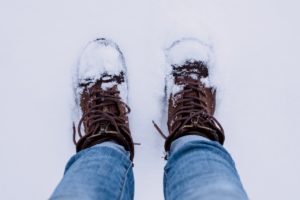With the onset of the “Winter Wonderland” season of New England, mother nature brings her fair share of snow, ice, rain and everything in between. Stay healthy and avoid trips to the emergency room with these easy tips.
Tip #1- Avoid slips and falls
This may seem like a no-brainer but it’s easy to get distracted by something and fall down. Stairs, sidewalks, driveways and roads all get covered in snow and ice, making it easier to slip and fall if you aren’t being careful. Make sure to use ice melt and other products to help get rid of ice and lower the risk of you or someone else falling. For older adults who may not walk as well, it can be helpful to use a cane, and put rubber treads or traction cleats on the bottoms of shoes to grip the ground and help prevent falls. Treads can be found on Amazon or at stores like Wal*Mart and Target. To learn more about the most recommended ice melt brands and pet friendly ice melt, check out this article from Business Insider.
Tip #2- Dress for the weather
Winter means cold temperatures and the need to dress warmer when you leave the house. Hypothermia and Frostbite are both risks during the cold seasons when spending prolonged periods of time outside. Remember that we lost heat through our feet, hands and head easier than other parts of the body so make sure that you wear warm shoes, gloves, and a hat. Wearing layers is a great way to stay warm, and if you do get too hot, you can always remove a layer. Another way to stay warm is to wear waterproof clothing and shoes. Staying dry reduces the risk of getting cold and lowering your body temperature to an unhealthy level. To learn the signs of Hypothermia and how to prevent it, check out the Centers for Disease Control and Prevention (CDC).
Tip #3- Avoid getting sick
Covid-19 has taught us that germs can spread easily, and this winter is no exception. While Covid-19 may be the focus of the world right now, the common cold and the flu are still out there in addition to Covid-19. Make sure that you wash your hands frequently, clean common surfaces in your home, and sneeze in to a tissue or your elbow. When you are in public, wear a mask and carry a pocket-size hand sanitizer with you to use after touching public surfaces, going into stores, or using public transportation. If you are sick, stay home and isolate to avoid spreading germs and getting others sick. If others live in your home, make sure that you are cleaning common spaces to reduce the transmission of any viruses. For more ways to clean and sanitize your home, visit the CDC website.
Tip #4- Winter Sports
Winter is a great time to get outside with family and friends and get a little big of exercise while having fun. From skiing and snowboarding, sledding and ice skating, to building snowmen and having snowball fights, winter sports can be a lot of fun. They can also put you at a higher risk for injuries. When participating in winter activities, make sure to wear appropriate clothing to stay warm and dry. Wearing the necessary protective gear, like helmets and goggles, to help prevent injuries also reduces your risk. Make sure to stretch before playing sports so your muscles are warmed up and less likely to result in a pulled muscle or other injury. In addition to stretching, know your limits to what you can and can’t do. Don’t overdue it or go beyond your skill level trying to show off. The most common injuries that result from winter sports are knee, ankle, finger, hand, and wrist injuries as well as lower back injuries. MTI Physical Therapy provides a great source on avoiding winter sports injuries.
Tip #5- Avoid driving during winter weather if possible
Winter weather means messy road conditions and a higher risk of getting into an accident. The best thing to do during a storm is stay home and stay safe. While it would be great to stay home for every storm, sometimes that’s just not possible. Sometimes storms start while you are at work, or you have an emergency and need to leave the house. If you do need to drive in the snowy conditions, make sure that you and your car are prepared for winter. Simple things like keeping a blanket and emergency pack in your car along with ice scrapers and snow brushes can go a long way if there is an issue. Most of all, make sure that your car is cleared off completely! Snow and ice can fly off your car and hit other cars behind you causing damage or an accident. In Connecticut, it is illegal to leave snow and ice on your car. For more tips on safe winter driving, visit the AAA website.
Tip #6- Reduce the risk of burns

Burns are a common reason why people visit the emergency room during the winter months. Fireplaces, electric blankets,and space heaters can all cause burns that require medical attention. Start by making sure that everyone in your household, no matter their age, understands what fire safety is, what emergency procedures your have, and how to handle a fire if one breaks out. Heaters should be placed where they can’t be knocked over easily and where there is proper ventilation. If you have small children or pets, consider putting a fence around the heater to keep them front knocking into it or touching it. Electric blankets often cause fires from faulty wiring and should never be left unattended or left on overnight. Make sure your home has working smoke detectors, carbon monoxide detectors, and fire extinguisher for emergencies. Take a look at these tips on winter fire safety.
Bonus Tip- Schedule your routine physicals!
Visiting your doctor for a routine physical each year can help you stay healthy and diagnose health issues that might lead to more severe conditions down the road. If you are concerned about contracting covid-19 and would prefer not to leave your home, ask your doctor about a Telehealth virtual visit! To schedule a physical with StayWell Health Center, call 203-756-8021 today!
Brought to you by Team at StayWell Health Center